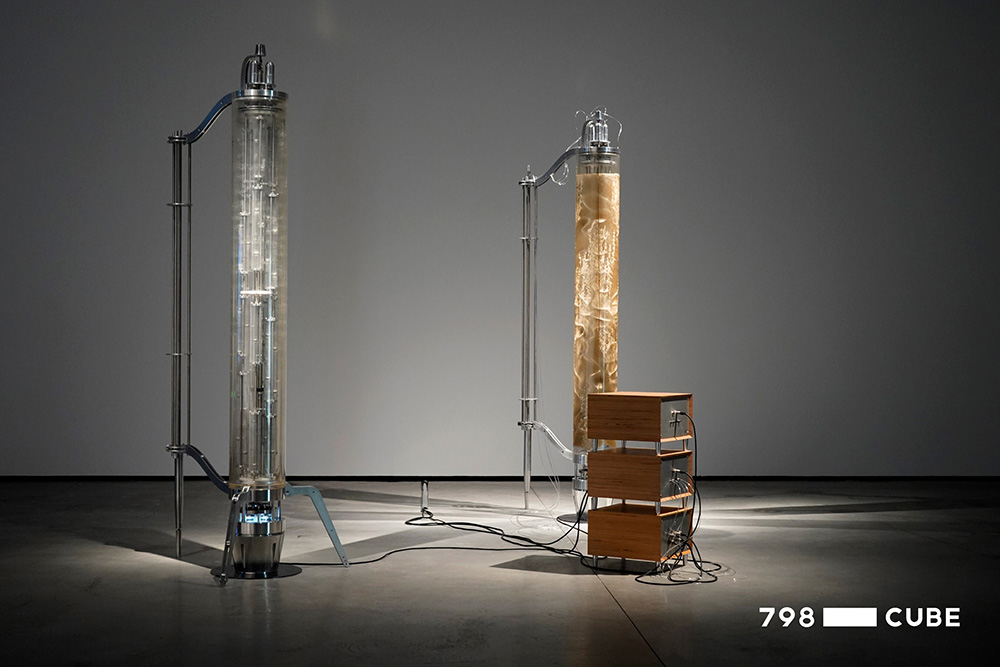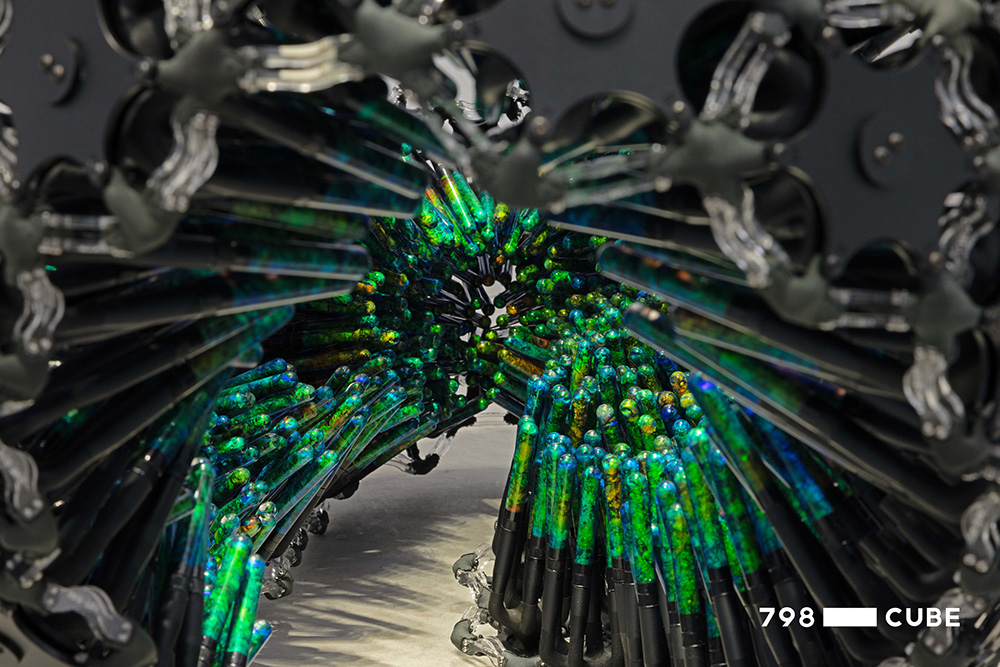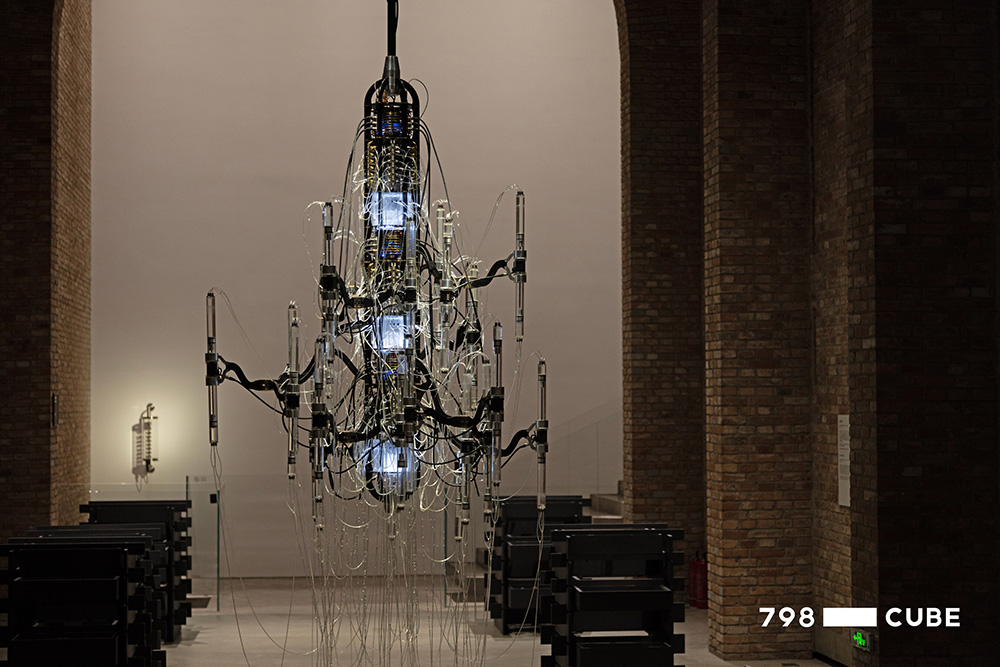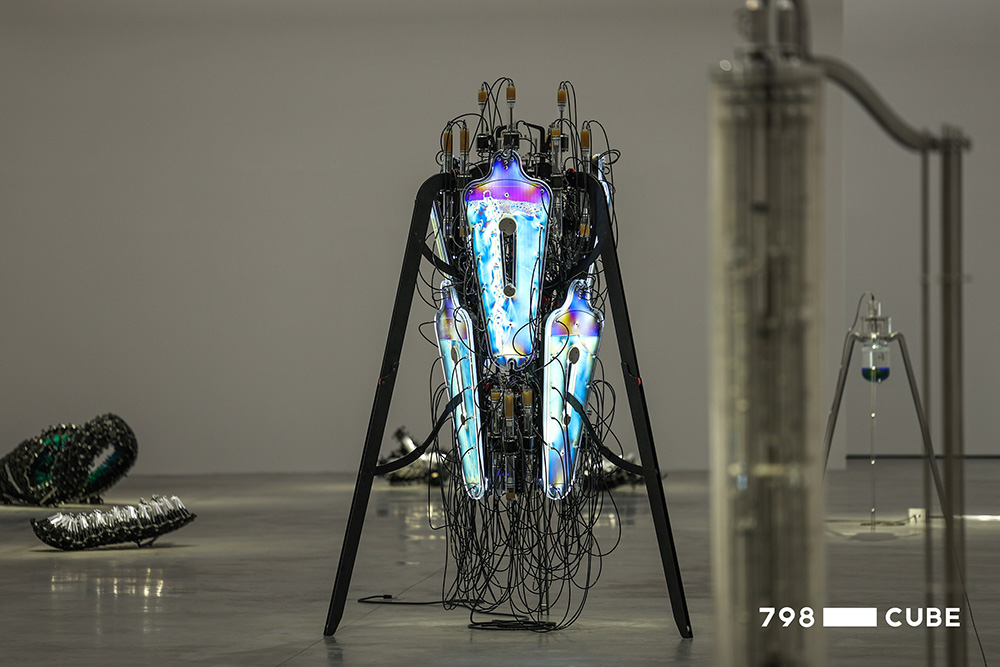The convergence of art and science can ignite thrilling innovations. Internationally renowned artist Yunchul Kim has crafted a universe of transmattering at 798CUBE, fostering the synergy of creative technology and forward-looking artistic production. His exhibition, Elliptical Dipole: Visceral Particles and Sorcerous Flows, marks both his debut solo showcase in China and his most extensive presentation to date.
According to Hera Lee, Executive Director of 798CUBE, the exhibition highlights the institution’s commitment to exploring the multifaceted intersections of cutting-edge art and technology. Elliptical Dipole: Visceral Particles and Sorcerous Flows delves into the intricate interplay between humanity, technology, and nature, as seen through Yunchul Kim’s distinctive lens. Utilizing diverse artistic mediums such as sound, unconventional painting methods, and kinetic installations, Kim constructs a richly imaginative material world. His works provide not only a visual feast but also engage deeply with philosophical and scientific dialogues.

Yunchul Kim, Installation view of Triaxial Pillars II, “Elliptical Dipole: Visceral Particles and Sorcerous Flows”, 798CUBE, Beijing, 2024.
The exhibition features Kim’s most iconic pieces from various phases of his career, alongside his latest experimental works. Visitors are invited to immerse themselves in the artist’s visionary matterReality (a term coined by Yunchul Kim) and resonate with the cosmic infinity, unraveling the perpetual enigma of polarity within the captivating vista of “Elliptical Dipole.”

Yunchul Kim, Installation view of Strata, “Elliptical Dipole: Visceral Particles and Sorcerous Flows”, 798CUBE, Beijing, 2024.
Encapsulating Yunchul Kim’s intellectual pursuit and artistic insight, ZHANG Ga, curator of the exhibition, has noted the following:
Yunchul Kim is an alchemist turned physi-chemical provocateur. He seems to bear the brunt of modernity’s quintessence. As an artist with a philosophical penchant for the most current, reminiscent of what Arthur Danto radically illuminated about art today, he is both old-school and ultra-modern, befitting what Giorgio Agamben has argued: “Contemporariness inscribes itself in the present by making it above all archaic.” He employs concepts such as pataphysics and transmattering in his thought process before getting entrenched or enchanted, one might say, in his intricate laboratory work with rocks and metals, recently also biological agents, churning them into micro-substances and unspeakable elements that can only be extrapolated in particle physics and electro-magnetic fluids that have dipolar charges to fire up otherworldly sensations and spiritual meditations.

Yunchul Kim, Installation view of Impulse, “Elliptical Dipole: Visceral Particles and Sorcerous Flows”, 798CUBE, Beijing, 2024.
Yunchul Kim thinks cosmologically and acts microphysically. He allows himself to indulge in cosmic reveries, meandering through the geophysical expanse and astrophysical immensity and permitting caprice in planetary temporality alongside the circadian cycle of earth-bound creatures. He is at once pre-scientifically abstruse, recalling when alchemistic enunciation proclaimed the divinity of a totality of the living and the undead, of solids and spirits, and in which the suprarational reigned in the domain of knowledge, and post-humanistically amorphous, by which homo sapiens is understood microbially in rapport with plants, and quantum mechanically in tandem with rocks and stones (we are all particles!).

Yunchul Kim, Installation view of La& Poussière& de& Soleils& II (Dust& of& Suns& II), “Elliptical Dipole: Visceral Particles and Sorcerous Flows”, 798CUBE, Beijing, 2024.
Argos (2022), our first encounter with Kim’s preternatural reality, is reminiscent of the monolith in Space Odyssey that channels the celestial stupendous to the everyday profane by the violent act of cosmic rays striking the earth’s atmosphere. In this ultimate contact of the human abode with the cosmos, the thousand-eyed monumental structure originating in Greek antiquity, equipped with a modern apparatus of a Geiger Muller tube, scans muons, the subatomic particle that is the result of the interstellar collision, transforming into sounds and lights and setting in motion cluster of actions and interactions of things and substances in their vicinity – it crisscrosses, traversing matters of different natures, magnitude and properties, materializing not only matters of fact but also “matters of concern,” as Bruno Latour would have it, enabling a reciprocity that is both physi-chemically necessary and ethical-aesthetically indispensable.
The French philosopher of science Gaston Bachelard once stated that “realization takes precedence over reality,” that is, in Yunchul Kim’s parlance, a techno-matteReality which foregoes the real perceived by human sensory faculties. Chroma IX (2024), the colossal, knotted assemblage of a vastly elongated ouroboros form, engenders a reality coming into being through the very process of putting into action the phenomenon of fluctuation of the variegated liquid that is the marvelous work of a modern alchemist, of an entanglement of energies both positive and negative, converging into an elliptic dipole in sedimentation and ascension. Yunchul Kim hence presents to us a reality through the actualization of a techno-phenomenological phenomenon: phenomenon that is instrumentally produced and has “no genetic tie to human consciousness and perception.” (Mark Hansen, The Critique of Data) In doing so, the artist has intuitively undone the damage of anthropocentric hubris and made equal footing of varied and multitudinous subjectivities.
We get a glimpse into Yunchul Kim’s underworld of alchemy.
Amorph II (2024) reveals, shedding light on the intricate contrivance and technicality Yunchul Kim creates in his visual enchantment. Rather than an optical illusion, the wondrous spectrum and brilliant intensity are a manifestation of a materiality of forces, both artificial and organic, solidified in the form of hydrogel derived from layers of seaweeds. Ancient tapestry techniques and the progressive mono-tonality of Morton Feldman weave into the transcendental splendor of the artist’s imaginative mattereality. Two installations of Amorph II, resonating with each other across the expansive gallery space, in Yunchul Kim’s pataphysical explication, make salient a “matterphor” in the physicality of an ellipse enacted by dipoles. It is eternity reconciled with evanescence, like in the quantum mechanical revelation of waves and particles, commingling, erupting, penetrating the Double Slit to land both infinitely far and near all at once. In that vertigo of electromagnetic charges, opposite forces achieve an equilibrium and arrive at the negentropic tranquility.
As if two elegant harps were to orchestrate a vortex of harmony and dissonance with the mechanical precision and articulation of clockwork, Triaxial II (2017) is a liquid furnace that incinerates metal particles and sand residuals, turning them into a fluid gyre, coagulating dissolution into suppleness, winding up, twisting down, cochleated, rushing geometry into entropy and vice-versa, disintegrating and regenerating. Yunchul Kim’s piece is cyclicity, open-ended closure, a system of reciprocity and a resolution of the polemic. It is this polyphony of multi-nodal intensity and Variantology, as German Media theorist Siegfried Zielinski might concur, that forms the leitmotif of the artist’s inner chamber.
If Zielinski’s polyphonic articulation on Variantology stems from his erudite study of Deep Time through the lens of media archeology, Yunchul Kim, once a student of the prolific professor, inherits not only his mentor’s pluralist worldview of humans ancient and modern, but also takes the word very literally in the mineralogical sense of stratification of rocks in light of geological immensity and with the cellulose composition of trees that enliven, and of that which subsists at the bottom of the deep ocean. In Strata (2024), the artist explores material verity that is beyond immediate human perception and cultural conception, excavating and unveiling the depth of pigmentation unseen by a naked eye.
In an homage to Raymond Roussel, the French poet who has inspired the artist during his formative years and alongside his prolonged pataphysical elucidation of the world through poetic, extra-scientific reveries and introspections (the artist named his studio after Roussel’s novel Locus Solus), Yunchul Kim has created a living sculpture, inventing a new substance granulated from minerals that can only be viewed by custom-designed lenses subtly integrated into hexagonal glass containers. Stony liquids gush from small jets inside the translucent vessel, arising upward as if longing for and embracing solar gravity, the source of all life. Transmuting and transforming the unstable into the potential, the boiling liquid culminates in the co-arousal and co-ascension of the organic and the artificial, incinerating all that are incommensurable and contradictory of the grime of the earth into the Dust of the Sun (La Poussiere de Soleils III, 2022).
If Studio Locus Solus is the hermitage where Yunchul Kim and his assistants exercise their arcana of metal, stone and vegetation, Remnant Vitrine (2024) opens a window unto the sorcerous inside. Nested in an alcove in the mezzanine area, the Remnant Vitrine is a miniature laboratory that hosts a medley of the alchemist’s archive of things, objects not following the convention of classification, but alongside the exactitude of materiality such as measurements beyond the apparently visible or matter’s indeterminacy contingent on temperature, pressure, and the elasticity that’s yet to be unleashed from the potentiality of the thing itself. The juxtaposition and infiltration of varied categories defy the taxonomy of species, genus, family, order, class, phylum, kingdom, domain, etc. The chandelier of magic (Impulse) hanging above appears as a crystallization of wondrous and uncanny things, its hydraulically powered pumps resemble the respiratory connectedness of a living tree, pulsating and resonating, circulating liveliness throughout in an audio-visual spectacle both sublime and subliminal.
Yunchul Kim paints, too, but in an uncanny stunt of painterly action. Call it particle painting; it embodies the artist’s somatic gestures that transpire in a process analogous to conventional painting or photo developing. Yet, it is also akin to unveiling the vicissitude of geological eternity. The bodily movement unpacks the trajectories of nature in the epiphany of microscopic rudiments. Eluvial Horizon (2024) reaffirms Yunchul Kim’s materialistic symbolism as action carved in longevity, here the ephemeral has acquired its indisputable manifestation in physicality and temporality.
As much a visual artist as an accomplished musician, Yunchul Kim constructs his own devices to make music that is electronically acoustic and classically avant-garde. His turntable-styled instrument C-Ray is a chemical reactor turned synthesizer which amplifies the seawater-generated electrical currents into audio signals. Sound is produced by a chemically infused “writing pencil,” inscribing onto an aluminum plate. It is a material imprint that materializes the inaudible.
Yunchul Kim eschews the convenience of a metaphorical toolkit, defies the dictatorial sovereign of the Signifier. His pataphysical imperative demands a “matterphor” that is capable of agential autopoiesis, that impregnates and brings forth. His world is otherworldly in which only surrationalism can untie the never-ending knot of polarity in the mesmerizing image of Elliptical Dipole. The artist’s mystic granules thus stir up emotive flux in the concurrence of cosmology and mineralogy, of biology and geology; of monad and dialectics, of immanence and contradiction; and ultimately, of life and death in the co-rising of the ascending flare of eternal return, in the atomic vortex that swallows humans and everything else, Yunchul Kim finds his own respite and solace.
The earthly space is a space where you can see the hydrodynamic flow of nanoparticles made from stones, seaweed, and trees. For example in the artwork La Poussière de Soleils II (Dust of Suns II) , Kim created a new substance composed of mineral particles that boiled and spewed in a hexagonal glass container, achieving the simultaneous awakening and sublimation of organic and artificial objects. And for his new creation Strata, explores physical realities that beyond human perception and cultural concepts, unearthed and revealed the depth of colors invisible to the naked eye.





